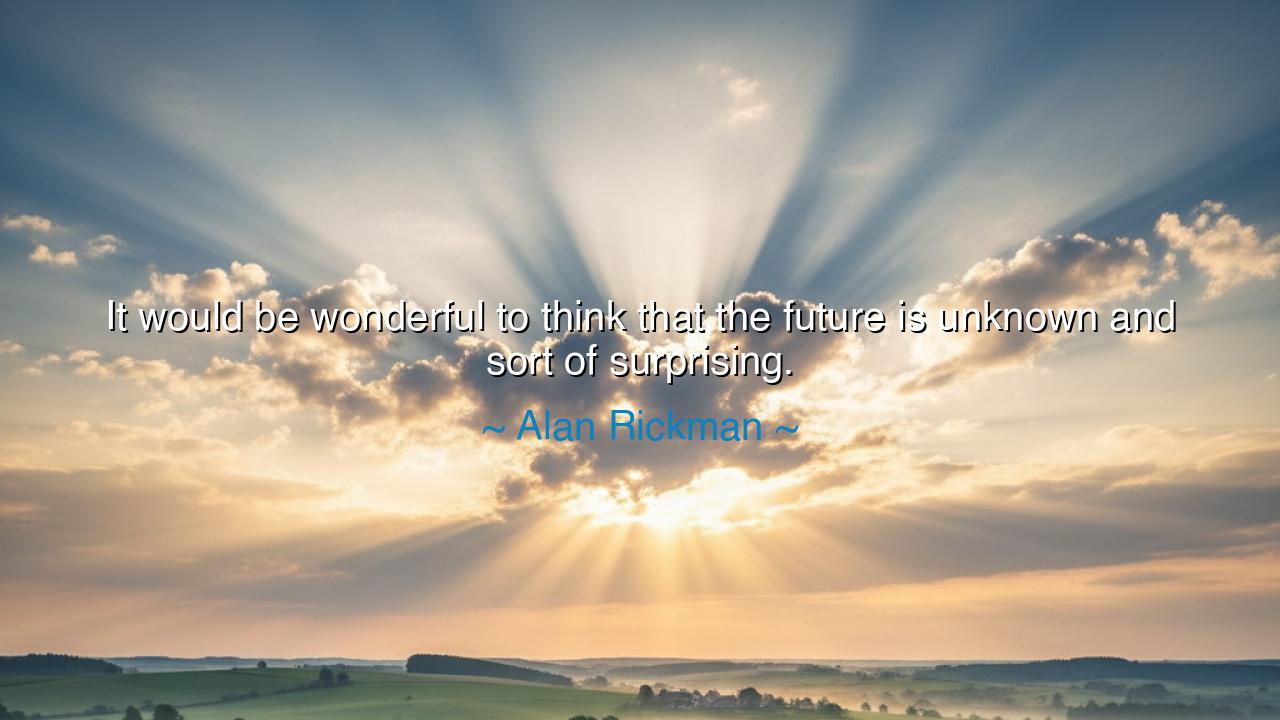
It would be wonderful to think that the future is unknown and






"It would be wonderful to think that the future is unknown and sort of surprising." These words by the esteemed Alan Rickman reflect a profound meditation on the mystery and wonder of life. Rickman, through his reflection, speaks to the universal human experience of uncertainty and expectation. To embrace the unknown future, to allow it to unfold in surprising and unpredictable ways, is both an invitation and a challenge. It reminds us of the beauty in the unpredictable, a reminder that life is not a rigid path, but a series of twists and turns that hold the potential to reveal something new, something transformative.
In ancient times, the notion of an unknown future was closely tied to the concept of fate and destiny. The Greeks had their Fates, three sisters who spun the threads of life, ensuring that the future was not entirely in the hands of the individual. The great hero Oedipus famously sought to avoid the prophecy foretold to him, only to realize that it was his very efforts to control the future that led him to fulfill it. In this sense, the future was something mysterious and inevitable, not something to be fully understood or planned for. It was unknown, and it was through that unknown that one found growth, wisdom, and, sometimes, even tragedy.
Consider the life of Alexander the Great, a man whose conquests reshaped the world and whose future seemed destined for greatness from a young age. But even Alexander, with all his military prowess, could not control the future in its entirety. His empire, built through visionary conquests, fell apart after his untimely death. Alexander’s life shows that even the most powerful individuals cannot shape the future completely. The unexpected twists in history, such as his sudden death and the fragmentation of his empire, reveal that the future holds not just what we expect, but what surprises us.
Rickman’s perspective, that the future can be surprising, speaks to the wisdom of embracing the unexpected. In this, he taps into the ancient concept of hope—the idea that the future is a realm of possibility rather than a fixed outcome. In ancient Rome, the philosopher Seneca wrote that we should not worry about the future, as it is often beyond our control and understanding. What lies ahead, he argued, is a source of potential, and the true measure of wisdom lies in being able to adapt and thrive in the face of uncertainty. Rickman, too, embraces the idea that the future, as mysterious as it is, holds within it the spark of wonder and opportunity.
The idea that the future is a surprise resonates with the lives of many great figures who, despite their ambitions and plans, encountered unexpected changes that shaped their destinies. Marie Curie, for instance, began her scientific career with a curiosity about radioactivity, never anticipating the revolutionary discoveries she would make. Her work, which earned her two Nobel Prizes, fundamentally changed the course of science, but it came from a place of unknowns—of venturing into a field where no one knew the full extent of its impact. She could not have planned the surprise of her groundbreaking discoveries, and yet it was this very unknown future that allowed her to make her mark on history.
In modern life, we are often consumed with trying to control every aspect of our future—whether it’s through career planning, financial security, or personal goals. Yet Rickman’s words remind us that life’s greatest gifts often come when we least expect them. The future, though filled with uncertainty, is a space where growth and new possibilities emerge. To live in the present and to embrace the surprise of what’s to come is to trust in the flow of life and to remain open to the opportunities that the unknown holds.
The lesson here is profound: embrace uncertainty. Life’s greatest wonders often come from the most unexpected places. Rather than trying to tightly control every outcome, we should learn to be open to the possibilities of the future. Like the ancient philosophers, who recognized that the future cannot be fully grasped, we must instead focus on being present and adaptable. In doing so, we allow ourselves the space to grow, to evolve, and to welcome whatever surprises life may bring. The future, as Rickman suggests, holds not only the potential for hardships but also the potential for beauty, joy, and unexpected transformation.
Let us take action by embracing the unknown with courage. Do not fear the surprises that lie ahead, but welcome them as opportunities to grow, to learn, and to create something new. Life is not a path we can control entirely; it is a journey, full of twists and turns that lead us to places we could never have planned. In this uncertainty lies the magic of life—the surprises that will enrich our experiences and shape our futures. So, with hope in our hearts and faith in the unknown, let us step forward into the future with wonder and expectation.






AAdministratorAdministrator
Welcome, honored guests. Please leave a comment, we will respond soon